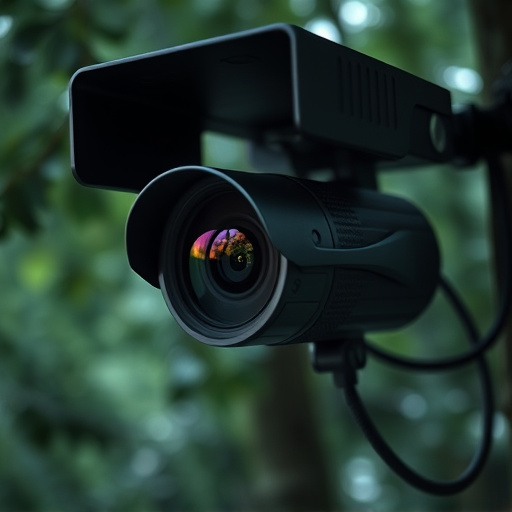Understanding and adhering to laws regarding secret nanny cameras is vital for both tenants and landlords. These laws protect privacy rights, especially in bedrooms and bathrooms, and prohibit unauthorized recording without consent. Tenants should be aware of their rights and take precautions against hidden cameras while landlords must prioritize transparency and foster trust through ethical surveillance practices. Knowing the legal framework ensures safety, respect, and a positive living environment.
In today’s digital era, the use of secret surveillance devices in rental properties has become a growing concern. While landlords have legitimate security interests, understanding the legal boundaries of so-called “nanny cameras” is crucial. This article explores the laws regarding secret nanny cameras, common hidden camera locations, tenant rights and privacy concerns, ethical considerations for landlords, and methods to detect and prevent these devices. By delving into these aspects, we aim to shed light on a complex issue that demands careful navigation.
- Understanding Legal Boundaries of Nanny Cameras
- Common Hidden Camera Locations in Rentals
- Tenant Rights and Privacy Concerns
- Ethical Considerations for Landlords
- Detecting and Preventing Secret Surveillance Devices
Understanding Legal Boundaries of Nanny Cameras
Understanding the legal boundaries surrounding secret surveillance, specifically in the context of nanny cameras, is paramount for tenants and landlords alike. While some states allow the use of these devices with certain restrictions, others have stringent regulations against hidden cameras. The Laws Regarding Secret Nanny Cameras vary widely, with many jurisdictions requiring explicit consent from all parties involved, especially when it comes to recording private conversations or activities within a rental property.
Tenants should be aware that installing secret surveillance devices without the knowledge of their landlords can lead to legal consequences, including potential fines and eviction. On the other hand, landlords must respect the privacy rights of their tenants and adhere to local laws regarding camera placement and usage, ensuring open communication about any monitoring systems in place for the safety and comfort of all parties.
Common Hidden Camera Locations in Rentals
In rental properties, hidden cameras are often placed in unsuspecting areas, raising privacy concerns among tenants. Common spots include near windows and doors, inside smoke detectors or light fixtures, under desks or beds, and within appliances like fridges or microwaves. Even bathrooms aren’t safe, with cameras strategically positioned to capture private moments. Landlords may use these devices for property security or to monitor cleaning staff, but the deployment of secret nanny cameras without tenant consent is illegal in many jurisdictions under laws regarding privacy rights and reasonable expectations of privacy.
The laws regarding secret nanny cameras vary across regions, but most agree that recording individuals in rental spaces without their knowledge is a serious breach of privacy. Tenants have the right to expect certain areas, such as bedrooms and bathrooms, to be off-limits for surveillance. Any use of hidden cameras must adhere to strict guidelines, ensuring transparency and respect for tenant privacy.
Tenant Rights and Privacy Concerns
Tenants have a right to privacy, and laws regarding secret nanny cameras or any hidden surveillance devices are in place to protect them. The use of such devices without consent is generally considered a violation of these rights. In many jurisdictions, it’s illegal to install cameras in areas where individuals would expect privacy, like bathrooms or bedrooms.
Privacy concerns arise when landlords or property managers secretly monitor tenants, creating an atmosphere of distrust and potential legal issues. Tenants should be informed about any surveillance systems in place and given the option to consent. Understanding the laws regarding secret nanny cameras can empower tenants to recognize and protect their rights, ensuring a safe and respectful living environment.
Ethical Considerations for Landlords
Landlords installing secret surveillance cameras in rental properties raise significant ethical and legal questions. While maintaining a safe and secure environment is understandable, the use of hidden cameras infringes on tenants’ privacy rights. The placement of these devices must adhere to local laws regarding secret nanny cameras, which vary widely across jurisdictions.
Ethical considerations demand transparency and consent from tenants. Landlords should inform residents about surveillance systems and obtain explicit permission for camera installation, especially in areas like bedrooms and bathrooms. Respecting personal boundaries and privacy is not just a legal requirement but also fosters trust between landlords and tenants, creating a more harmonious living environment.
Detecting and Preventing Secret Surveillance Devices
Detecting secret surveillance devices in rental properties is a growing concern for tenants and advocates alike, as the use of hidden cameras—often referred to as “nanny cams” when illegally installed—has become more prevalent. While some states have laws regarding secret nanny cameras, many landlords and property managers remain unaware or choose to ignore these regulations, making it crucial for tenants to be proactive in identifying potential breaches of privacy.
Tenants can take several steps to prevent and detect secret surveillance devices. Regularly inspecting electrical outlets and light fixtures for any unusual hardware or devices is a good starting point. Additionally, staying vigilant during regular property checks and being mindful of any new or unexplained items can help uncover hidden cameras. Knowing the laws regarding secret nanny cameras in your state is essential; if you suspect illegal surveillance, document evidence carefully and consult with legal experts to understand your rights and the best course of action to protect your privacy.
While the use of secret surveillance devices, particularly hidden cameras, in rental properties may raise concerns about safety and security, it’s crucial to understand and adhere to the laws regarding secret nanny cameras. Tenants have legitimate privacy rights, and landlords must balance their needs with ethical considerations. By being aware of common hidden camera locations and understanding tenant rights, both parties can navigate this delicate issue responsibly. Regular checks and open communication can help detect and prevent secret surveillance devices, fostering a safer and more transparent living environment.
